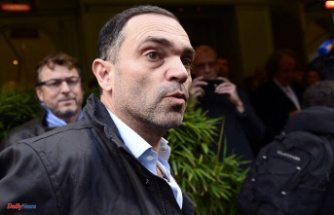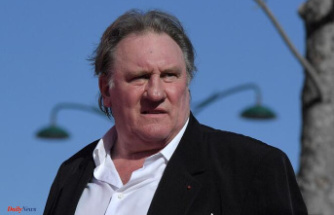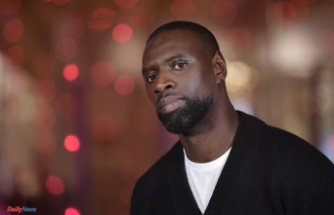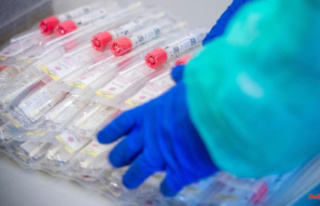Around 80,000 children in Germany live in foster families. Tobias Wilhelm and his son have been part of these families for four years. The 33-year-old can no longer imagine life without his son.
Tobias Wilhelm already knew as a teenager that he would like to be a father. Holding the much younger cousins in your arms, having them around you and also telling them a bit where to go, that felt good. He could be that father. Today Wilhelm is a father, or as he puts it in the title of a book: "Something like your papa".
The relativizing in this description has a simple reason: Wilhelm is not the biological father of the child with whom he lives. He is the foster father. "Five years ago, examinations by the urologist made it clear that becoming a father would be difficult in a natural way," Wilhelm tells ntv.de. With his partner at the time, he looked for alternatives and soon ruled out reproductive medicine and adoption. But taking on a foster child sounded like a good idea. "We thought the children already existed."
His foster son has been living with him for four years now. He takes care of the child in an alternating model with his former partner. A father on the playground, that's normal now. It's still not quite a foster father, says Wilhelm.
There are around 80,000 foster children in Germany. Many of them are not only admitted to emergency care for a short time, but live permanently with a foster family. Also Wilhelm's son, who is called Noah in the book. The plan for him is that he grows up permanently in the family construct of the foster family. In special training courses, people are prepared for foster parenthood.
The Berlin Senate points out in its range of information that you do not have to be married to take in a foster child. "Even single people and unmarried or same-sex couples can take in a foster child," said the Senate. It is important that the age between the foster parents and the child is not too great, there is enough living space, secure economic conditions and, above all, time and attention for the new family member.
Wilhelm has all of that when he takes in his foster child. He takes a break from his job, rearranges his apartment and gets to know his foster son better every day. Many everyday things turn out to be universal: What am I cooking? Which bedtime ritual is the most promising? Which playground has the coolest slides and the nicest kids? But with other topics, the differences quickly become clear. How do I convey the fact that there are biological parents? How do I make up for missing baby time together to get to know each other? How do I deal with the gaps that will always exist in knowledge about the family of origin? How do I deal with this family?
"I've noticed that I'm able to quickly build up basic trust," says Wilhelm about the first time with his foster child. On the other hand, he was surprised at how he always outgrew himself to master the next situation with the foster child. Wilhelm's own father took parental leave 30 years ago, cooked and did the laundry. A caring father was nothing new, Wilhelm has now found his own way. "I'm not strict, but consistent," he says.
He sees himself as a present and up-to-date father and is always amazed at what mothers say about their partners or ex-partners on the playground, for example, and their share of the care work. "Then I think, really?" Along with other fathers, he is still in the minority at parents' evenings, although there is no question for him that men should and should also take on this responsibility. "Then I think that not so much has changed in the last 30 years."
In the book, the problems of foster families are mentioned again and again. For example, foster parents can take parental leave in order to be able to take better care of the children when they arrive. However, they do not receive parental allowance. During this time, Wilhelm lived off his savings. Contact with the youth welfare office and family of origin is not always good and supportive for foster families. But Wilhelm also didn't want to serve the cliché that there always has to be drama associated with foster children. "It always depends on the individuals. How good they are at finding compromises. In our case, it works quite well."
On the other hand, there are of course reasons why children cannot or should not grow up with their own parents. Depending on the study, 30 to 50 percent of foster children have mental problems, 40 percent have developmental deficits and two-thirds have school problems. Wilhelm's foster son still receives psychological support to this day.
It's been a long time since Noah understood that he now has a daddy. At that time, he observed another child calling for his father from the top of the monkey bars. "'Papa' he used for a while as a sort of howl of triumph when he accomplished something that was difficult." Initially, Wilhelm was not meant by this.
With children's books, the two approach the concept of father. That he now has a dad dawns on Noah at some point while changing diapers, Wilhelm describes the authentic situation in the book. "'Father?' 'Yes, I'm something like your dad.'" Despite the rather matter-of-fact description, one can guess what this moment meant for the two. "I understood, I love him more than anything. And he understood, he's not going away anymore. He won't leave me," is how Wilhelm describes it today.
The 33-year-old now has a new partner who met him as a foster father. He has not regretted his decision to be a foster father, even if he sometimes wishes for a better legal position in the network of responsibilities between family of origin, youth welfare office and foster family. After all, he is with Noah 24/7. Wilhelm works part-time and does not consider his life with a child to be compatible with a full-time office job. "For me, after four years now, our family feels very familiar and intimate. There are always a bit of ups and downs, that's life."












